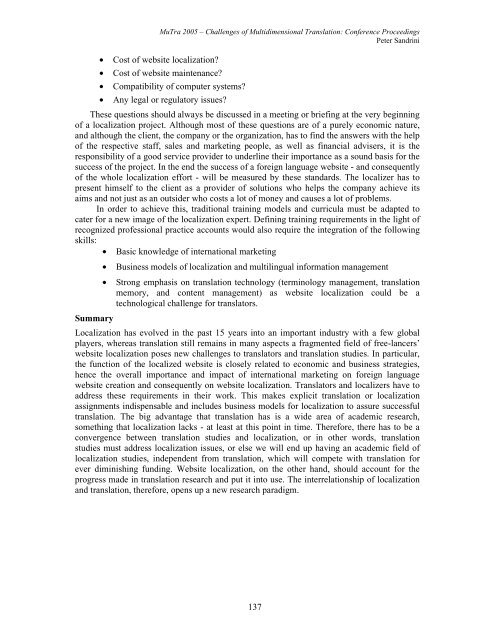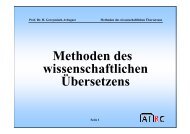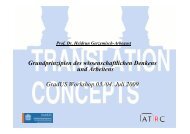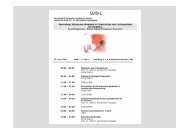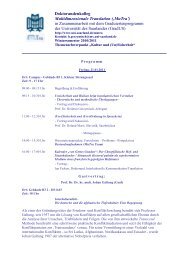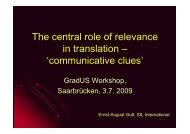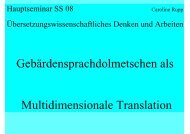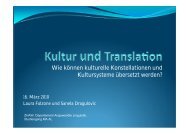Proceedings - Translation Concepts
Proceedings - Translation Concepts
Proceedings - Translation Concepts
You also want an ePaper? Increase the reach of your titles
YUMPU automatically turns print PDFs into web optimized ePapers that Google loves.
MuTra 2005 – Challenges of Multidimensional <strong>Translation</strong>: Conference <strong>Proceedings</strong><br />
Peter Sandrini<br />
• Cost of website localization?<br />
• Cost of website maintenance?<br />
• Compatibility of computer systems?<br />
• Any legal or regulatory issues?<br />
These questions should always be discussed in a meeting or briefing at the very beginning<br />
of a localization project. Although most of these questions are of a purely economic nature,<br />
and although the client, the company or the organization, has to find the answers with the help<br />
of the respective staff, sales and marketing people, as well as financial advisers, it is the<br />
responsibility of a good service provider to underline their importance as a sound basis for the<br />
success of the project. In the end the success of a foreign language website - and consequently<br />
of the whole localization effort - will be measured by these standards. The localizer has to<br />
present himself to the client as a provider of solutions who helps the company achieve its<br />
aims and not just as an outsider who costs a lot of money and causes a lot of problems.<br />
In order to achieve this, traditional training models and curricula must be adapted to<br />
cater for a new image of the localization expert. Defining training requirements in the light of<br />
recognized professional practice accounts would also require the integration of the following<br />
skills:<br />
• Basic knowledge of international marketing<br />
Summary<br />
• Business models of localization and multilingual information management<br />
• Strong emphasis on translation technology (terminology management, translation<br />
memory, and content management) as website localization could be a<br />
technological challenge for translators.<br />
Localization has evolved in the past 15 years into an important industry with a few global<br />
players, whereas translation still remains in many aspects a fragmented field of free-lancers’<br />
website localization poses new challenges to translators and translation studies. In particular,<br />
the function of the localized website is closely related to economic and business strategies,<br />
hence the overall importance and impact of international marketing on foreign language<br />
website creation and consequently on website localization. Translators and localizers have to<br />
address these requirements in their work. This makes explicit translation or localization<br />
assignments indispensable and includes business models for localization to assure successful<br />
translation. The big advantage that translation has is a wide area of academic research,<br />
something that localization lacks - at least at this point in time. Therefore, there has to be a<br />
convergence between translation studies and localization, or in other words, translation<br />
studies must address localization issues, or else we will end up having an academic field of<br />
localization studies, independent from translation, which will compete with translation for<br />
ever diminishing funding. Website localization, on the other hand, should account for the<br />
progress made in translation research and put it into use. The interrelationship of localization<br />
and translation, therefore, opens up a new research paradigm.<br />
137


